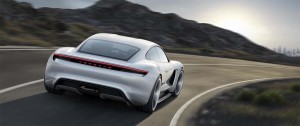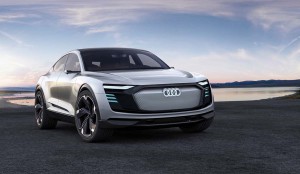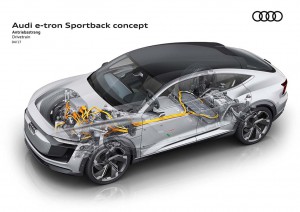As it shifts away from its long dependence on diesel powertrains, Audi is looking to rapidly ramp up its electrification program, but the luxury arm of Volkswagen Group will have to slash spending to cover the costs of its new technology.
Audi intends to cut costs by 10 billion euros, or $12 billion, by 2022 to support its aggressive shift to electrification, according to a report by Germany’s Handelsblatt business publication.
That money will help it bring to market five all-new battery-electric vehicles, or BEVs, as well as a range of plug-in hybrids and conventional hybrids, according to the report.
The bulk of the savings would come from current research and development costs, though Audi is expected to ramp up R&D efforts for its electrification program. And it will be able to share some of those costs with VW and other sibling brands, including upscale marques like Bentley, Lamborghini and Porsche, which also are pushing into electric propulsion.
(Tesla delivers first 30 Model 3 battery-cars to buyers. Click Here for more.)
Audi’s decision to trim back other R&D programs reflects the costly hit the maker has taken as the result of its diesel emissions scandal. While the VW brand was hardest hit among the Group’s marques, Audi has of late come under the spotlight. It announced the recall of 850,000 diesel vehicles earlier this month to fix their emissions systems.
(For more on that recall, Click Here.)
Separately, German and American prosecutors have also ramped up their criminal probes, charging one executive with helping cover up the scheme. The Reuters news service said on Friday that four of the brand’s top seven executives will be dismissed in connection with the scandal “in the near future.”
Audi has said that it will trim back its diesel line-up as a result of the scandal. It is likely to now only offer a single “oil-burner” in its American product mix.
Zero- and near-zero-emissions vehicles emphasizing battery power are expected to replace a number of existing models. The roll-out is planned to begin in 2018, the automaker has confirmed, with a new e-tron, or pure battery-powered, sport-utility vehicle. It has not confirmed what all-electric models will follow, but they are expected to cover a broad size range and include both passenger cars and utes.
As with its more mainstream products, Audi is expected to try to share development costs and at least one new battery vehicle platform is reportedly being developed jointly with Porsche. That sports car brand is also pushing into electrification, albeit more slowly. Porsche already offers a mix of hybrids and plug-ins and will introduce its first all-electric model, the Mission E, in 2019, with a sales target of 20,000 a year.

Audi will work closely with other VW brands, notably Porsche which is building the Mission E battery car.
The VW brand is setting the most aggressive pace for electrification, however, company officials laying out a plan to have 30 all-electric models in the line-up by 2025. That includes a production version of the small I.D. concept car introduced last year. It will be priced, VW said this month, close to $30,000 which, the maker hopes, will give it a price advantage over the new Tesla Model 3, which starts at $35,000.
Audi is expected to maintain a price premium for its electric offerings, though sources tell TheDetroitBureau.com that it will try to be aggressive in a strategy aimed at positioning it directly up against Tesla.
(Audi embarrassed by ad suggesting husbands-to-be should shop for a bridge the same way they do for a used car. Click Here for the story.)



Watch out Tesla.